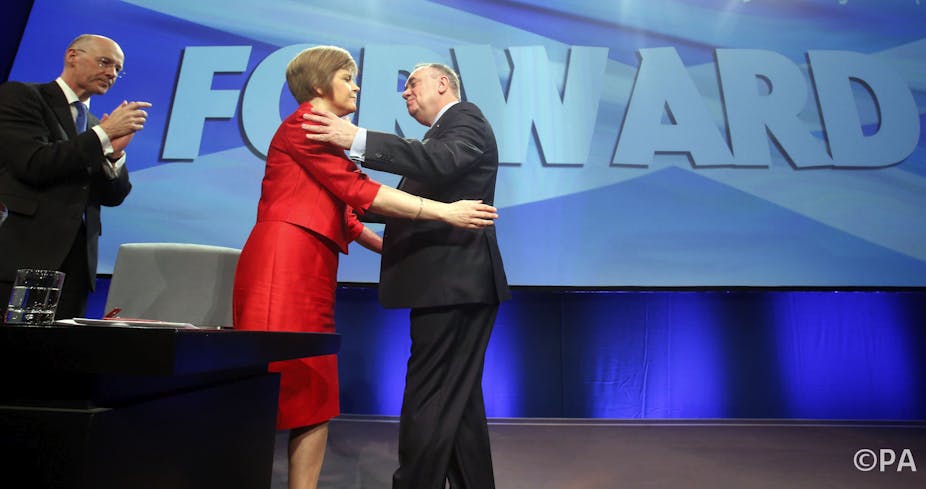I was asked about three times this week by journalists covering the referendum whether David Cameron would have to resign in the event of a Yes vote. Nobody asked me about Alex Salmond. But when you lose the big one, somebody has to be responsible. Not only that, Salmond wouldn’t have had a great time at first minister’s questions after this. It would always be about the referendum. It would have been a stick with which to beat him, and stop his party or the independence movement from putting this week’s events behind them.
Instead he’s chosen the timing of his departure. Obviously it is a huge loss because he’s a big political figure and an effective strategist. He’s one of the big beasts of British politics.
He will have talked to his wife Moira about it, and his key lieutenants, but they won’t necessarily have known the timing. It’s actually a clever bit of media management in my opinion. He’s moved on the agenda from people being depressed about the No vote and from the media endlessly repeating it over the weekend to focusing on him and the SNP instead.
Party rejuvenation?
I would argue that it’s a good move for the SNP, most of whom have been focused mainly on the Yes campaign for the past couple of years. They haven’t spent much time concentrating on the party. They are probably feeling exhausted and raw. The fact that he’s stepped down and left a vacancy will galvanise them.
For sure, it’s almost inevitable that his deputy, Nicola Sturgeon, will become party leader and first minister. She has also been ubiquitous for the several years of the referendum campaign as its effective leader. That was a deliberate strategy to have her in the spotlight rather than leaving it to Alex Salmond all the time. She has certainly had a great referendum. It’s given her huge exposure in Scotland, and to some extent further afield. Again that will put her in pole position.
I am not even sure someone would stand against her, though that would be a mistake in my view. The party could do with a contest, with the main contenders going around the country talking to groups of SNP members to take advantage of their one-member-one-vote ballot system. This would help bring the party back together in the run-up to their conference in November.
That matters because having got over-excited after the September 6 YouGov poll in the Sunday Times that put Yes ahead, they need to focus on the fact that there is a general election in eight months’ time. They will need to have a strategy.
Radical moment
Assuming Sturgeon does become the next leader, you can imagine that the SNP is going to become a bit more radical. She is widely considered to be more left wing than her senior colleagues. That could make for some interesting dynamics in Scottish politics when you think about the growth of the Yes movement, the Greens and the socialists, and the Labour party’s efforts to reassert its social-democratic credentials. Assuming Johann Lamont stays on as Scottish Labour leader, it would mean two female leaders at the top of Scottish politics. To namecheck one of Sturgeon’s favourite TV programmes, it would be Borgen time.
Neither could you rule out the prospect of Sturgeon’s deputy being a woman. She is seen as being close to culture minister Fiona Hyslop and sports minister Shona Robison, for example. Having said that, a number of other people could equally come into consideration. We will be looking at a new generation taking over the party.
The constitutional consolation
Whatever happens next, the SNP has actually been left in a good position from the No vote in some ways. It won in places like Glasgow and significantly damaged Labour on the ground. And its leadership knows that the UK parties can’t deliver on all the devolution pledges. We’ve already seen how Cameron has put Labour in a very difficult position by proposing to tie up Scottish powers with English devolution and the issue of non-English MPs voting on England-only issues.
Remedying this would cause problems for Labour governments because they have sometimes relied on their Scottish MPs to drive through key pieces of legislation. Salmond saw that one coming years ago. Now he’s going to know that his successor will be able to exploit it. The SNP doesn’t have to do anything now. The pressure is on the other parties. Independence may have been parked, but the constitutional issue has certainly not been.

